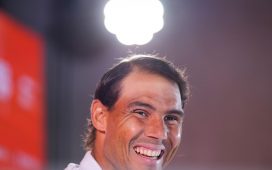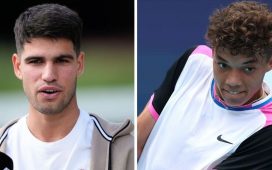Aslan Karatsev is a bit of a businessman. It is not just the way he buttons his shirt almost to the neck, but also the efficient cock of his left leg when making a backhand return. The eagerness to finish points fast, and the quick blow of his fingers when he does. Cooling the smoking gun, ready for the next round.
Of course, the small crowd allowed to return to Rod Laver Arena on Thursday night won’t really know too much about these tendencies, for this Russian has hardly been on the radar until now.
Even Novak Djokovic is probably still studying the idiosyncrasies of his Australian Open semi-final opponent, wondering how this qualifier has made it this far when grand slams are historically unkind to inexperience.
Those who don’t have to play him, who can simply admire from a distance, have been equally bewildered and bewitched by this man named Aslan, with muscle and magic as mythical as his Narnia namesake. He was almost slain on Felix Auger-Aliassime’s Stone Table but rose from the dead for a five-set fourth-round win. He made lighter work of ailing quarter-final foe Grigor Dimitrov on his way to becoming the first man in the Open era – in more than half a century – to reach the final four of a grand slam on debut.
Who is this nomad from the foothills of the Caucasus mountains, whose Jewish heritage took he and his family to Tel Aviv as a toddler, and who has since lived back in Russia, Germany, Spain and Belarus? “I was moving around too much,” he conceded on Tuesday night after beating Dimitrov. There is a sense Minsk, where he relocated last year to work with new coach Yahor Yatsyk, may finally be home.
Before Covid-19, Karatsev had won only one of his 93 tournaments. Since the resumption of the tour in August, he has won 26 of 32 matches. Now, at world No 114, Karatsev is the lowest-ranked man to reach the Australian Open semis since Patrick McEnroe (also No 114) in 1991, and the lowest to make the final four of any major since Goran Ivanisevic (No 125), who won Wimbledon as a wildcard in 2001.

It has taken him 10 qualifying attempts just to get into the main draw of a major. The 27-year-old had not beaten a top-40 opponent before last week. Five days ago he took his first top-10 scalp – a third-round straight-sets upset of eighth seed and world No 9 Diego Schwartzman. Now he will stare down the world No 1.
Djokovic has posed with the Australian Open trophy eight times on Rod Laver Arena, while Karatsev has played on Melbourne’s main court just the once – 48 hours ago. Equally absurd is the disparity between their ATP Tour win-loss ratios. Djokovic’s pre-tournament figure was 936-192; Karatsev’s was 3-10. Similarly, the Serb has won $188m from his 81 professional titles, while Karatsev’s total career earnings standss at less than $800,000. Even if he loses his semi-final, he will more than double that at Melbourne Park.
This startling run may not be enough to alarm Djokovic, but he will almost certainly be alert to the danger of an entity far less predictable than that to which he has become accustomed. “Very strong guy physically, moves well,” Djokovic said. “Has a lot of firepower from the back of the court, great backhand – the Russian school of tennis.”
Both Karatsev’s forehands and backhands were faster, on average, than any other competitor in the final eight – including Rafael Nadal. He is a high-risk, high-reward kind of guy. A late bloomer has to be.
Karatsev did not play his first ATP Tour match until 2012, when he was 19. Djokovic was 20 when he won his first grand slam, at the 2008 Australian Open. Indeed, Karatsev did not play above the ATP 250 level until 2019, when he was beaten by Jeremy Chardy in the first round of the ATP Masters 1000 in Shanghai. In 2020, he climbed almost 200 places to a career-high ranking of 111.
“I try to believe in what I’m doing on the court, and it’s helped me to win matches,” Karatsev said. “I arrive to the court and say, ‘I try to do my best with more belief’. The key is the right coach that I found. I was really lucky to find him.”
Belief may not be enough against Djokovic, a man with 17 grand slam titles, though there is that pesky abdominal strain. “I have never experienced this kind of injury during a grand slam and kind of keep going,” Djokovic said.
“I have had a rollercoaster of a tournament since the third round and an injury that happened, and unpredictability of what happens next. “He [Karatsev] doesn’t have anything to lose, really. He’s motivated. I expect him to come out and really go for his shots, and try his best and try to take that win.”







